Published May 16, 2025 | 9:00 AM ⚊ Updated May 24, 2025 | 7:52 PM
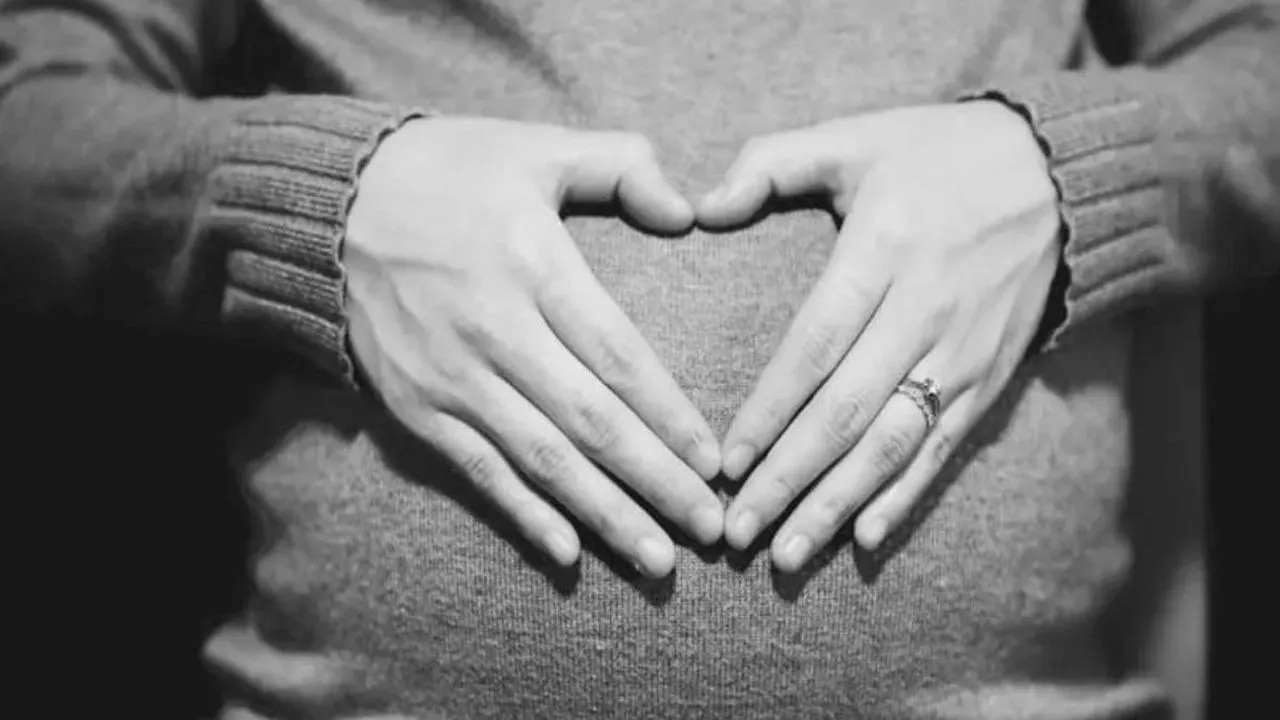
Religious leaders strongly rejected any religious sanction for home births, reaffirming that no faith advocates risking lives by avoiding hospitals.
Synopsis: A deeply entrenched culture of home deliveries exists in the Malappuram district, carried out in secrecy, often driven by religious beliefs, financial constraints, and patriarchal control.
Kerala’s hard-earned reputation for stellar maternal and infant health indicators is now facing an unsettling challenge.
The growing menace of planned home births — a clandestine practice long brushed under the carpet — continues unabated, with the state health department seemingly chasing shadows.
The tragic death of 35-year-old Asma during childbirth at her rented home in Malappuram on 5 April jolted the system into action, triggering fresh debates and long-overdue crackdowns.
Yet, beneath the surface lies a complex, unsettling reality: a shadowy nexus preying on families mostly vulnerable, peddling unfounded religious beliefs, stoking nosocomephobia (fear of hospitals), and convincing women to shun institutional deliveries.
Amid this, social media spaces have turned volatile, with orchestrated narratives unfairly targeting specific districts and communities, distracting from the state’s failure to confront the root causes.
What drives women to risk childbirth at home, away from trained medical care in a state celebrated for its healthcare model? The answers, both uncomfortable and urgent, remain largely unexamined.
Going by the statistics, the alarming prevalence of planned home births in the state happens mostly in the Malappuram district.
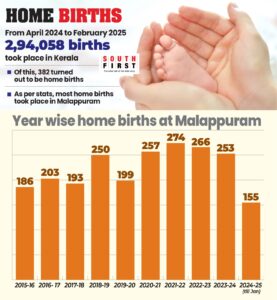
Home births.
Interestingly, the scenario was laid bare in a crucial health department review meeting held as early as 13 April 2023.
Documents and discussions from the meeting, accessed by South First, reveal a deeply entrenched culture of home deliveries in the district, carried out in secrecy, often driven by religious beliefs, financial constraints, and patriarchal control.
The district’s Reproductive and Child Health (RCH) officer had disclosed at the meeting that 266 home deliveries took place in Malappuram in the 2022-23 financial year, the highest in Kerala, with a significant portion being planned births assisted by untrained midwives.
Shockingly, babies born through these deliveries often miss out on vaccinations, posing serious public health risks.
The Valavannur Health Block, particularly in Thanaloor, Ozhoor, and Ponmundam PHC areas, emerged as hotspots.
The meeting heard how some women from outside the district also travelled here for home deliveries.
Notably, a WhatsApp group reportedly operates in the region to coordinate such clandestine births, involving a network of midwives like Zainaba, Fatima, Sulaikha Thanalur, and Shamima Othukkungal.
These midwives stay at home during labour and leave soon after, evading authorities. Health workers reported being denied access to homes known for planning home births.
Even after repeated counseling by ASHA and JPHN staff about the dangers of home deliveries, families, predominantly from ‘Thangal’ and ‘Musaliar’ communities, persisted, often citing religious reasons.
Girls in some areas were reportedly allowed to study only up to the 7th standard, with childbirth managed within the community.
Valavannur’s Medical Officer noted that while most women underwent prenatal checkups at hospitals, they preferred to deliver at home, with health officials discovering the births only during birth certificate applications.
In one tragic instance, an infant’s death from a failed delivery involving shoulder dystocia was reported to the police, but no action followed.
The minutes of the meeting noted that the infant mortality rate was higher in areas with more home births.
Cases of women giving birth at home from their first to fourteenth child were flagged, revealing how early and repeated pregnancies, teenage childbirth, and poor family planning remain rampant.
Frustration was evident among health officials who complained of zero support from local political leaders and panchayat members when reporting casualties or seeking intervention.
Alarmingly, the report mentioned instances of gynecologists unofficially endorsing home births via video calls.
Despite routine maternal health meetings and attempts to curb the practice, Malappuram’s home birth network remains resilient, organised, and shrouded in silence.
The health department’s 2023 review meeting had already raised the red flag, yet little changed on the ground.
As Malappuram grapples with the aftermath of a tragic home birth that claimed the life of Asma, a fresh wave of social media vitriol is unfairly targeting the Muslim community, painting the entire district in a negative light.
However, both health authorities and religious leaders have come forward to strongly reject any religious sanction for planned home births, reaffirming that no faith advocates risking lives by avoiding hospitals.
The Malappuram district administration, aware of the region’s social fabric and its Muslim-majority population, has turned to religious and community leaders to counter myths and misinformation.
A high-level meeting held on 17 April, just twelve days after Asma’s death, saw religious heads unequivocally declare that no religious doctrine opposes medical intervention during childbirth.
District Collector VR Vinod, who convened the meeting, said in a social media post that a clear consensus was reached — no religion supports planned home births over safe deliveries in hospitals.
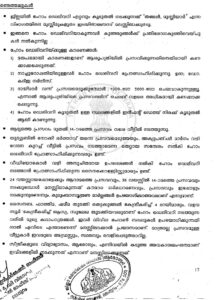
An excerpt from the minutes of the review meeting in 2023
The meeting formed a crucial part of the ongoing campaign, ‘The baby should be born in the safest hands — choose the hospital to make the birth safe,’ spearheaded by the district health department.
Religious leaders unanimously conveyed that isolated incidents of home births were neither backed by religious organizations nor rooted in any theological principle.
“No religion stops a woman from seeking hospital care,” they emphasized.
They also pointed out that Islam does not explicitly prohibit hospital deliveries. There is no verse in the Quran or authenticated Hadith (sayings of the Prophet Muhammad) that forbids Muslims from seeking medical care, including hospital-based childbirth.
It has been highlighted that the choice of some Muslims to opt for home deliveries instead of hospitals often stems from cultural, personal, or traditional preferences rather than a religious mandate.
They further urged intensified awareness drives to dismantle the dangerous misconceptions still lingering in some quarters.
At the same time, leaders cautioned health officials about the rising public distrust over unnecessary caesarean sections and medical interventions, urging for greater transparency.
Health department officials assured that a government-level auditing mechanism was in place to address such concerns.
The death of Asma triggered swift legal action. Her husband, Sirajudeen, and the woman who assisted the home delivery, Fathima from Othukkungal — a name previously flagged during a 2023 review — were arrested.
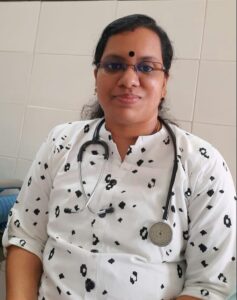
Dr Prathibha K
The police invoked the grave charge of culpable homicide not amounting to murder, sending a clear and uncompromising message.
“After this, no planned home births have been reported in the district,” Dr Prathibha K, Medical Officer at the Tanur Community Health Centre, told South First.
Dr Prathibha, who in 2024 filed a writ petition (W.P. (C) No.46366 of 2024) in the Kerala High Court seeking state-wide guidelines to prohibit home births, noted that “as far as I know, no religious connection exists in this. Those promoting home births are driven by ulterior motives, and the law must deal with them firmly.”
The High Court, while considering the matter on 9 May 2025, directed the Directorate of Health Services to obtain a detailed report from the District Medical Officer, Malappuram. The case will be taken up again on 10 June.
Activist Kulathur Jaisingh, who has been lobbying for decisive action, minced no words.
“Those coercing families into planned home births are committing a crime against society. If complications arise, they lack the means to intervene — the result is often fatal or leads to lifelong health issues for the mother or child. The authorities must act strictly, and awareness is the key,” he asserted.
Meanwhile, a visible change was unfolding on the ground. The number of home deliveries in the state saw a sharp decline — a shift many attributes to sustained awareness campaigns led by the Local Self Government Department (LSGD) in collaboration with the Health Department.
According to data from the Health Department, 46 home deliveries were reported in March 2025. However, by April, that number had dropped to 26.
The trend was even more striking in Malappuram district — often flagged for high instances of home births. From 26 home deliveries in March, the figure plummeted to just six in April.
This positive shift followed proactive intervention by Prathiba, who had earlier urged the government to intensify awareness efforts against unsafe home births.
Acting on her request, the LSG Directorate, on 9 April, issued a directive to all local body secretaries in Malappuram, asking them to roll out awareness drives highlighting the risks of home deliveries and the importance of institutional births.
The early results, officials say, are encouraging — hinting at the impact a targeted grassroots campaign can make when health workers and local self-governing bodies come together for a cause.
Expressing grave concern over the death of Asma, the Kerala Government Medical Officers’ Association (KGMOA) has called for stringent legislation to prevent such incidents.
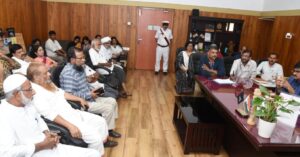
Malappuram District Collector V R Vinod in talks with religious leaders
The organisation termed the practice of opting for unscientific treatments over modern medical care as a “criminal attitude” and demanded urgent government intervention.
KGMOA pointed out that while Kerala has achieved health indicators comparable to developed countries, the persistence of home births — estimated at around 500 annually out of nearly three lakh deliveries — threatens this hard-earned progress.
The association urged the state to enhance public awareness, invest in public health infrastructure, and establish fully equipped delivery points with round-the-clock services of gynaecologists, paediatricians, and anaesthesiologists in every district.
Citing the World Health Organisation’s year-long campaign to prevent maternal and child deaths, KGMOA reaffirmed its commitment to constructive cooperation with the government while demanding strict legal measures against those denying citizens access to quality maternal care.
Earlier, state health minister Veena George termed the death of Asma as a ‘deliberate act of murder.’ According to her, the trend of planned home births is ‘deeply concerning’ and the untoward incidents connected with it will have to be considered as cases of culpable homicide not amounting to murder.
While questions have been raised about the role of acupuncture, the ancient Chinese healing technique of inserting fine needles into precise points on the body to relieve pain and improve overall health, in the planned home births in Malappuram, there is another side to it.
The technique has increasingly found a place in modern maternity care around the world.
Several countries have formally integrated acupuncture and a related technique called acuneedling into hospital-based maternity services.
In the United Kingdom, midwives in labour wards routinely use acupuncture to ease labour pain and promote natural births, with formal training provided by healthcare institutions.
German hospitals have a longstanding tradition of offering acupuncture during childbirth, often to induce labour or correct breech positions, sometimes combined with moxibustion.
Across Scandinavia, midwives are trained in acupuncture to manage labour pain and support natural delivery.
In the United States, the Military Health System has provided acupuncture to pregnant women since 2005, though it remains rare in civilian hospitals.
And in its country of origin, China, acupuncture remains a widely accepted part of obstetric care, used in tandem with modern medicine for labour induction and pain relief.
It seems planned home births — fuelled by superstition, fear, and misinformation — risk undoing decades of progress.
While the tragedy of Asma’s death has jolted the system into long-overdue action, dismantling this deeply entrenched network demands more than sporadic crackdowns.
It calls for sustained legal measures, transparent healthcare practices, and culturally sensitive awareness campaigns led by both health professionals and community leaders.
The challenge before Kerala is clear: to reclaim its healthcare legacy by ensuring that every birth happens in the safest possible hands, not in secrecy, but in the light of care, science, and dignity.
(Edited by Majnu Babu).

